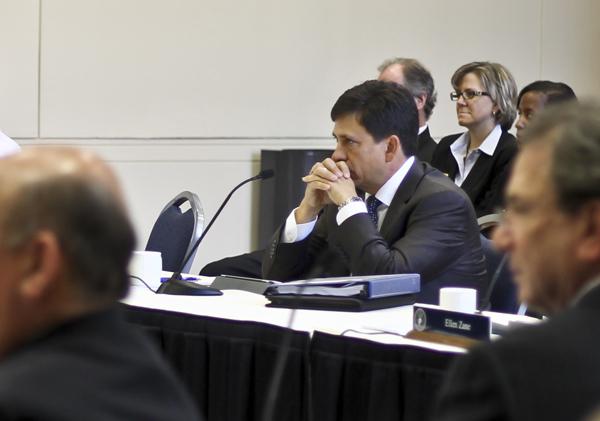The Board of Trustees is pledging to increase its financial oversight over the University’s budget, requesting more frequent updates about how GW spends its money.
The move falls in line with newly elected Board chair Nelson Carbonell’s goal of expanding the group’s responsibilities within the University. The announcement also comes in the aftermath of financial warnings from GW’s credit agencies and the GW School of Business’ $13 million of overspending last year.
“We want the entire board to participate in really what’s going on. It’s really about making sure people get the information and that they understand the information, ultimately,” Carbonell said.
Carbonell said he wants each trustee to receive regular updates to prepare them for May talks about approving more than $1 billion of capital and operational spending. In the past, only members of the Board’s finance and audit committee have regularly reviewed University’s overall spending and expenses throughout the year.
The effort aligns with the University-wide budget review, which calls on schools to more regularly report their financial health to GW’s administration, University spokeswoman Candace Smith said.
Trustees have been pushed into action across higher education – overcoming tendencies to wield just a rubber stamp – because of financial pressures and legal liabilities such as those that transpired at Penn State University.
And now, with a University budget that has swelled by 71 percent since 2001, the decisions have higher stakes.
The University’s perfect credit rating would be “under pressure in the future” if it can’t cut down on borrowing in the wake of recent construction projects that cost half a billion dollars, the rating agency Standard & Poor’s wrote in a report earlier this year.
And financial oversight in GW’s colleges has come under fire this fall. Some faculty blamed the University for lacking oversight and a strong internal control system because it did not fully find the GW School of Business’ $13 million spending gap until it closed the books in July. Disputes over the overspending led to the firing of former business school dean Doug Guthrie in August.
But even with the added level of oversight from the Board, accounting professors said it won’t make a difference until the University’s budget accounting software is updated.
Associate professor of accounting Angela Gore said the added levels of accountability are “only for show” and that the Board still needs to fix the root of the problem: the accounting system and software.
“Oversight only works if the accounting systems are working properly. The main issue is that the University’s financial reporting system doesn’t provide timely, accurate information. Having an ‘extra layer’ of people examine the same bad numbers won’t do much,” Gore, who specializes in nonprofit accounting, said.
Sok-Hyon Kang, who was the vice dean for faculty and research at the business school last year, said increasing the transparency won’t help fix problems that are ingrained in GW’s 10 schools’ budget systems. “Having more watchful eyes without fixing the ‘system’ would not work,” Kang said.
As part of GW’s current budget system, deans meet with the provost and the budget office for verbal check-ins quarterly. Some deans also meet regularly with financial directors.
Kang called for an overhaul of that system and said GW should calculate the school’s spending regularly without forcing administrators to rely on their own Excel spreadsheets between quarterly check-ins with the provost.
Ellen Zane, chair of the finance and audit committee, said the committee has not yet decided precise ways to improve the budgeting process, and how to allow trustees to more closely scrutinize each line item in the University-wide budget.
Still, top administrators and trustees did not attribute the heavier oversight to concerns about the business school budget or heavy debt.
Zane said corporations’ budget management systems need “a constant evolution” to keep up with best practices. She served as the CEO of Tufts Medical Center and replaced Carbonnel as chair of the finance committee this fall.
“I don’t think there should be any head-scratching about what’s in that line item. I think we have to know what’s in there and what they are accountable for,” Zane, who is also the Board’s vice chair, said.
In this year’s capital budget, there are about 50 line items related to construction, such as classroom space in 1957 E St. and classroom technology at the Virginia Science and Technology Campus.
Provost Steven Lerman said reviewing GW’s budget system is key as administrators plan for $243 million in spending on its decade-long strategic plan, which includes funding for about 200 specialized research institutes and 100 endowed professors.
“The budget process has to go hand-in-hand with the implementation of the strategic plan. We can’t just create centers. We have to figure out how they’re budgeted and make it clear what resources they have available to them to achieve their missions,” he said in an interview.
Lerman added that he foresees “more information going to the Board” from the University due to the effort.







